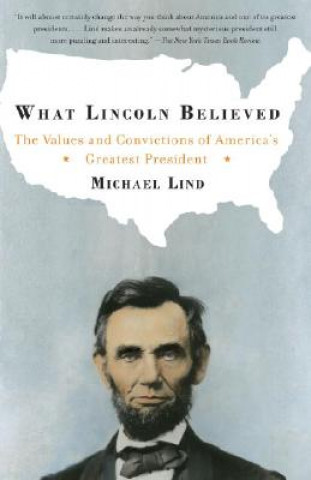
Kod: 12050655
What Lincoln Believed: The Values and Convictions of America's Greatest President
Autor Michael Lind
Few biographers and historians have taken Lincoln's ideas seriously or placed him in the context of major intellectual traditions. In "What Lincoln Believed, the most comprehensive study ever written of the thought of America's mo ... więcej
- Język:
 Angielski
Angielski - Oprawa: Miękka
- Liczba stron: 358
Wydawca: ANCHOR, 2006
- Więcej informacji o książce

101.41 zł
Zwykle: 102.48 zł
Oszczędzasz 1.06 zł

Dostępna u dostawcy
Wysyłamy za 14 - 18 dni
Zobacz książki o podobnej tematyce
-

Hummingbird on the Left
89.69 zł -5 % -

Twinkle, a Christmas Story
61.33 zł -1 % -

The Life and Adventures of John A. Murrell, the Great Western Land Pirate
143.81 zł -

Lawrence Police Department
112.04 zł -6 % -

God Chasers: Interactive Study Guide
63.23 zł -4 % -

She Who Remembers
56.22 zł -

Plainsboro
112.04 zł -6 %
Podaruj tę książkę jeszcze dziś
- Zamów książkę i wybierz "Wyślij jako prezent".
- Natychmiast wyślemy Ci bon podarunkowy, który możesz przekazać adresatowi prezentu.
- Książka zostanie wysłana do adresata, a Ty o nic nie musisz się martwić.
Więcej informacji o What Lincoln Believed: The Values and Convictions of America's Greatest President
Za ten zakup dostaniesz 59 punkty
 Opis
Opis
Few biographers and historians have taken Lincoln's ideas seriously or placed him in the context of major intellectual traditions. In "What Lincoln Believed, the most comprehensive study ever written of the thought of America's most revered president, Michael Lind provides a resource to the public philosophy that guided Lincoln as a statesman and shaped the United States. Although he is often presented as an idealist dedicated to political abstractions, Lincoln was a pragmatic politician with a lifelong interest in science, technology, and economics. Throughout his career he was a disciple of the Kentucky senator Henry Clay, whose "American System" of government support for industrial capitalism Lincoln promoted when he served in the Illinois statehouse, the U.S. Congress, and the White House. Today Lincoln is remembered for his opposition to slavery and his leadership in guiding the Union to victory in the Civil War. But Lincoln's thinking about these subjects is widely misunderstood. His deep opposition to slavery was rooted in his allegiance to the ideals of the American Revolution. Only late in his life, however, did Lincoln abandon his support for the policy of "colonizing" black Americans abroad, which he derived from Henry Clay and Thomas Jefferson. Lincoln and most of his fellow Republicans opposed the extension of slavery outside of the South because they wanted an all-white West, not a racially integrated society. Although the Great Emancipator was not the Great Integrationist, he was the Great Democrat. In an age in which many argued that only whites were capable of republican government, Lincoln insisted on the universality of human rights and the potential fordemocracy everywhere. In a century in which liberal and democratic revolutions against monarchy and dictatorship in Europe and Latin America repeatedly had failed, Lincoln believed that liberal democracy as a form of government was on trial in the American Civil War. "Our po
 Szczegóły książki
Szczegóły książki
101.41 zł
- Pełny tytuł: What Lincoln Believed: The Values and Convictions of America's Greatest President
- Autor: Michael Lind
- Język:
 Angielski
Angielski - Oprawa: Miękka
- Liczba stron: 358
- EAN: 9781400030736
- ISBN: 1400030730
- ID: 12050655
- Wydawca: ANCHOR
- Waga: 281 g
- Wymiary: 204 × 133 × 21 mm
- Data wydania: May 2006
Ulubione w innej kategorii
-

Dune
34.67 zł -33 % -

Haunting Adeline
125.17 zł -1 % -

Berserk Deluxe Volume 2
212.16 zł -1 % -

White Nights
15.22 zł -23 % -

Powerless
48.50 zł -11 % -

Atomic Habits
57.22 zł -28 % -

Dune Messiah
46.09 zł -3 % -

Berserk Deluxe Volume 3
217.07 zł -3 % -

One Day
34.17 zł -44 % -

Berserk Deluxe Volume 1
210.76 zł -2 % -

Iron Flame
60.82 zł -28 % -

Surrounded by Idiots
36.57 zł -28 % -

Harry Potter and the Prisoner of Azkaban (Minalima Edition)
169.57 zł -2 % -

Gravity Falls Journal 3
88.79 zł -

Heaven Official's Blessing: Tian Guan Ci Fu (Novel) Vol. 1
85.18 zł -5 % -

The Creative Act
99.71 zł -15 % -

Dune
47.09 zł -23 % -

Hunting Adeline
125.87 zł -4 % -

A Little Life
46.79 zł -14 % -

Children of Dune
46.49 zł -2 % -

Heaven Official's Blessing: Tian Guan Ci Fu (Novel) Vol. 2
77.36 zł -14 % -

Bungo Stray Dogs, Vol. 8 (light novel)
65.43 zł -4 % -

Percy Jackson and the Olympians 5 Book Paperback Boxed Set
184.60 zł -4 % -

Solo Leveling, Vol. 1
86.28 zł -3 % -

The Prisoner's Throne
44.69 zł -12 % -

Court of Thorns and Roses
36.37 zł -26 % -

Cry Baby Coloring Book
47.09 zł -1 % -

Fourth Wing
71.55 zł -15 % -

Icebreaker
34.97 zł -26 % -

Berserk Deluxe Volume 6
217.07 zł -3 % -

Avatar, the Last Airbender: The Kyoshi Novels (Box Set)
168.36 zł -2 % -

The 48 Laws of Power
98.01 zł -14 % -

House of Leaves
123.46 zł -3 % -

Twisted Lies
37.57 zł -26 % -

Dune Messiah
49.40 zł -13 % -

No Longer Human
65.23 zł -4 % -

48 Laws Of Power
60.82 zł -28 % -

Twisted Games
37.57 zł -26 % -

Caraval Paperback Boxed Set
174.68 zł -3 % -

Solo Leveling, Vol. 2
74.45 zł -23 % -

Open Circuits
168.76 zł -2 % -

Berserk Deluxe Volume 5
155.74 zł -30 % -

Heaven Official's Blessing: Tian Guan Ci Fu (Novel) Vol. 3
77.86 zł -13 % -

Berserk Deluxe Volume 4
207.85 zł -3 % -

Court of Mist and Fury
35.17 zł -28 % -

SOLO LEVELING V08
87.98 zł -2 % -

English File Upper Intermediate Multipack A (4th)
100.11 zł -

CHAINSAW MAN V14
43.39 zł -21 % -

Before the Coffee Gets Cold
33.76 zł -26 %
zadowolonych klientów
Od roku 2008 obsłużyliśmy wielu miłośników książek, ale dla nas każdy był tym wyjątkowym.
Copyright! ©2008-24 libristo.pl Wszelkie prawa zastrzeżonePrywatnieCookies


 21 milionów książek
21 milionów książek Dostawa 10.99 zł
Dostawa 10.99 zł (32) 444 93 66 (8-15.30h)
(32) 444 93 66 (8-15.30h)